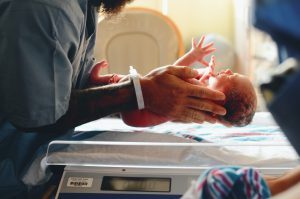
© unsplash.com
With COVID-19 disrupting neonatal health systems globally, a group of experts undertook a thematic analysis of healthcare providers’ experiences using a disseminated online survey. Results show high levels of stress on healthcare providers, disruption of newborn care practices, and lack of guidelines regarding preterm newborns and babies with low birthweight (LBW) during the pandemic. There is an urgent need to protect life-saving interventions.
The implementation of the Every Newborn Action Plan in 2014 by the UN Member States has helped significantly prevent neonatal mortality worldwide. Nevertheless, there are still country disparities, and new challenges arise from the COVID-19 pandemic, with low and middle-income countries (LMIC) being most affected.
Preterm babies and babies with low birthweight are at the centre of these challenges. There is a lack of neonatal guidelines, reduced quality services, and discouragement of family-centred-care such as kangaroo mother care (KMC) or breastfeeding.
The researchers tried to address the urgent need to provide insights into coverage and neonatal care quality disruptions by using an online survey in a cross-sectional global study. The target group were newborn healthcare providers, such as nurses, midwives and physicians, as well as public health professionals and policymakers. The questionnaire was based on previous surveys and included questions on the area of work, healthcare preparedness to COVID-19, and the effect of the pandemic on health professionals and newborn care. Respondents were also requested to list major disruptions in their work environment and give possible solutions. A total of 1120 participants from 62 countries responded to the survey, which was available in three languages.
The analysis revealed concerning findings. KMC was reportedly practised by 85% of respondents before the pandemic, compared with 55% during the pandemic. 12% of respondents reported a total mother-infant separation. Other results on COVID-19 neonatal preparedness showed a lack of testing, followed by decisions like postponing KMC care and breastfeeding until the negative test was provided. Considering the benefits of KMC and breastfeeding for newborns, an increase in additional neonatal deaths from the disruptions of those services has been estimated, resulting in devastating long-term consequences.
Regarding neonatal care provision during the pandemic, the questionnaire revealed a reduction in hospital births and neonatal admission of more than 25%. It was also stated that families were reluctant to access and stay in facilities, contributing to the newborn follow-up care being compromised by 48,5%. Other changes to newborn care included the reallocation of unit space and staff reassignment to COVID-19-related areas.
Inadequate supply of personal protective equipment (PPE) was also frequently noted as a barrier to quality neonatal care. The reasons for many neonatal facilities’ inconsistencies were the missing maternal/newborn-care-guidelines, leading to misinformation, misguidedness, and ultimately an increase of fear and stress for healthworkers and families.
Luckily, a broad spectrum of solutions for neonatal care disruptions was suggested. Some aimed at promoting counselling sessions with families to educate them, increasing their confidence to initiate and continue KMC and breastfeeding. At the facility level, most solutions aimed at guaranteeing infection prevention and control (IPC) measures, including intensifying the use of PPE. Increasing personnel, reaching universal testing and expanding infrastructure were also possible systemic solutions. Finally, community interventions and greater government involvement were given to be of great importance for improving newborn care in the future.
The life-saving approach of keeping mothers and newborns together alongside other family-centred-care solutions is crucial to ensure the provision of essential and respectful care during a challenging global pandemic. Direct mortality risk from SARS-CoV-2 infection in newborns is low. Indirect effects of the COVID-19 pandemic have already increased neonatal mortality. Preterm and low birthweight neonates are the most vulnerable citizens and need to be protected.
Paper available at: BMJ Global Health
Full list of authors: Suman P N Rao, Nicole Minckas, Melissa M Medvedev, David Gathara, Prashantha, Seifu Estifanos6, Alfrida Camelia Silitonga, Arun Singh Jadaun, Ebunoluwa A Adejuyigbe, Helen Brotherton, Sugandha Arya, Rani Gera, Chinyere V Ezeaka, Abdou Gai, Abebe Gebremariam Gobezayehu, Queen Dube, Aarti Kumar, Helga Naburi, Msandeni Chiume, Victor Tumukunde, Araya Abrha Medhanyie, Gyikua Plange-Rhule, Josephine Shabini, Eric O Ohuma, Henok Tadele, Fitsum W/Gebriel, Amanuel Hadgu, Lamesgin Alamineh, Rajesh Mehta, Elizabeth Molyneux, Joy E Lawn
DIO: https://orcid.org/0000-0002-4573-1443

